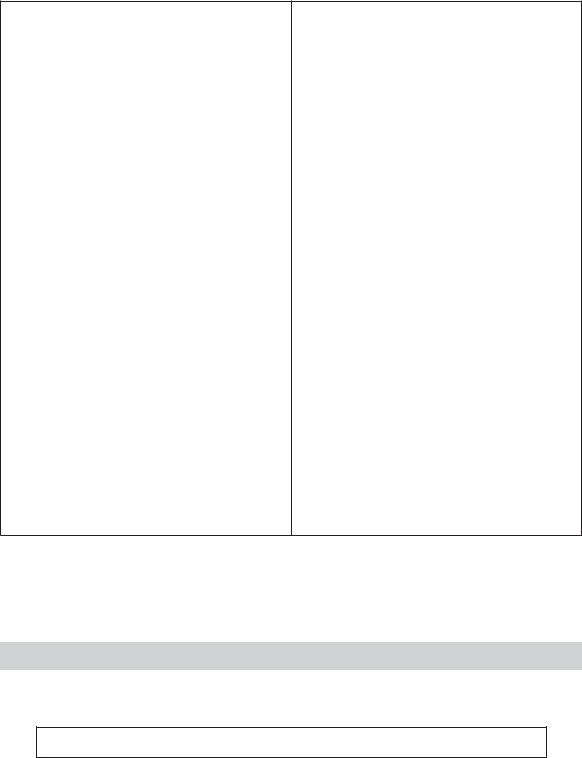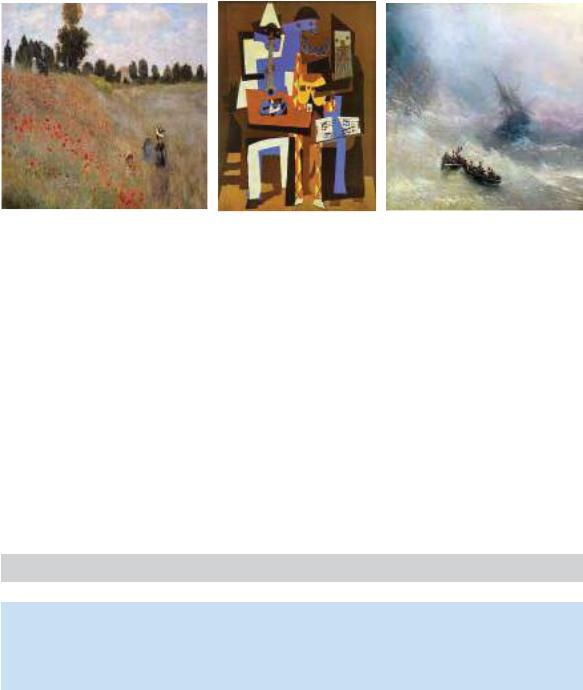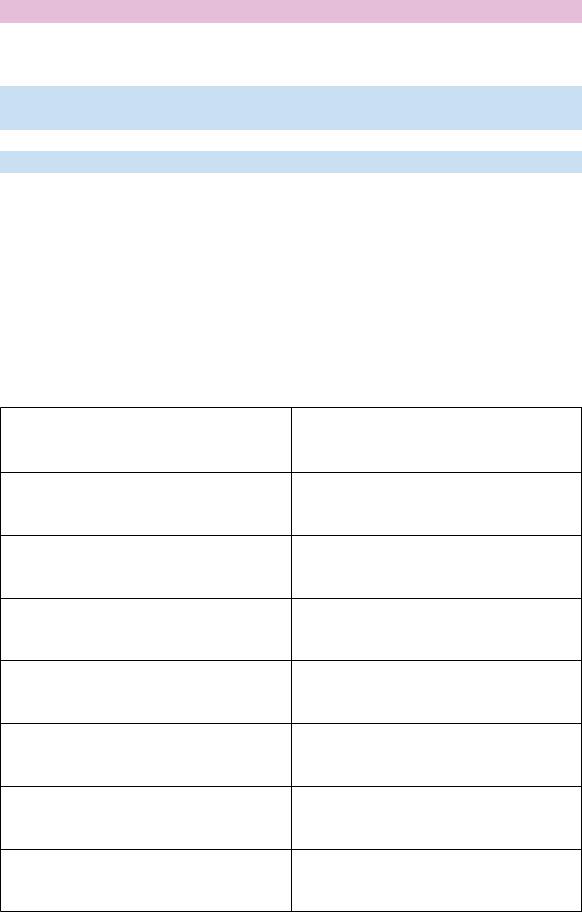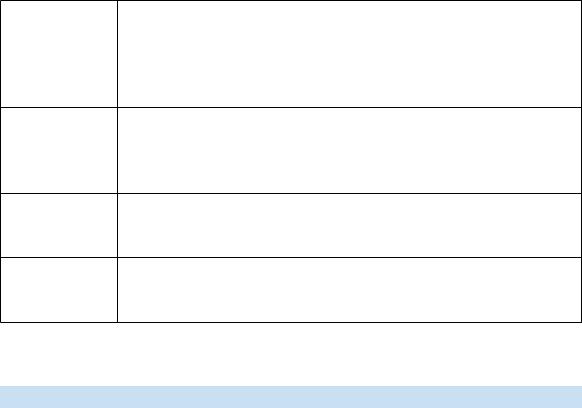
книги2 / 123
.pdf
Grammar tip 3
Gerunds are used
1) after prepositions and phrasal verbs:
He reached this effect by mixing fantasy and reality.
He gave up smoking.
2) after the following phrases:
I can’t help… It is worth… It is no good… It is no use… I can’t stand…
What about …? Do you mind…?
It’s no use crying over spilt milk. It is worth testing the new device.
3) after look forward to, be used to, object to:
I am looking forward to seeing you in Moscow.
I am used to getting up early.
I object to smoking in public places.
Infinitives are used
1) after indirect objects:
I must ask you to reconsider your statement.
His findings caused him to investigate further.
He made us laugh. (bare infinitive)
My parents wanted me to become a lawyer.
2) as adverbial modifier of purpose or result:
Hydrogen and oxygen unite to form water. He went to Harvard to study law.
with too, sufficiently, enough:
The waves are too short to affect the eye. This method is not accurate enough to give reliable results.
3) with the words first, second … last: The first scientist to discover this phenomenon was Lavoisier.
The last person to see her alive was Mr Benson.
Special note: You can use either infinitive or gerund after these verbs, with no difference in meaning: love, like, begin, continue, prefer, start.
TEST YOURSELF
1. Complete each sentence with the gerund or infinitive form of the verb in the box. apply be listen make try wash work write answer
1. He tried to avoid _________ my question. 2. Could you please stop ________ so much noise? 3. I enjoy _______ to music. 4. I considered _________ for the job but in the end I decided against it. 5. Have you finished ________ your hair? 6. If you walk into the road without looking, you risk _______ knocked down. 7. Jim is 65 but he isn’t going to retire
61
yet. He wants to carry on _______. 8. I’ve put off ______ the letter so many times. I really must do it today. 9. Sarah gave up ______ for a job in this country and decided to go abroad.
2. Complete each sentence with a suitable word.
1. Don’t forget ________ the letter I gave you. 2. There was a lot of traffic but we managed
_________ at the airport in time. 3. Jill has decided not _________ a car. 4. We’ve got a new computer in our office. I haven’t learnt _________ it yet. 5. I wonder where Sue is. She promised ________ late. 6. We were all too afraid to speak. Nobody dared ________
anything.
3. Put the verb in brackets into the correct form.
1.When I’m tired, I enjoy ________ television. (watch)
2.It was a nice day, so we decided _______ for a walk. (go)
3.Would you like ______ skiing? (go)
4.I’m not in a hurry. I don’t mind _______. (wait)
5.They don’t have much money. They can’t afford _______ out very often. (go)
6.I wish that dog would stop ________. It’s driving me mad. (bark)
7.Our neighbor threatened ________ the police if we didn’t stop the noise. (call)
8.We were hungry, so I suggested ______ dinner. (have)
9.Hurry up! I don’t want to risk _______ the train. (miss)
10.I’m still looking for a job but I hope _______ something soon. (find)
4.Gerund or infinitive? Put the verbs in brackets in the right form (infinitive or gerund).
a)1. I cannot recall (get) those results before. 2. They discussed (run) the experiments again. 3. Susan used to (deal with) difficult kids. 4. Do you wish (participate) in the symposium? 5. She recommends (read) Marx. 6. I suggest (repeat) the experiment. 7. I am looking forward to (hear) from you. 8. I am used to (work) long hours. 9. I object to people (smoke) cigarettes in public places. 10. Do we need (look for) new methods? 11. We could offer (change) the time of the meeting. 12. She encouraged him (look) beyond the obvious. 13. They promise (demonstrate) the new equipment. 14. He will look after (mail) the tickets. 15. If you are used to (have) money, it’s hard to be without it.
b)1. She refused (cooperate) any longer. 2. He was accused of (forge) documents. 3. We
cannot afford (hesitate). 4. She did not want (go) first. 5. He was the first (take) the test. 6. Something seems (be) wrong with your design. 7. We invite you (attend) the ceremony. 8. He insisted on (proofread) the article again. 9. They did not expect us (win) an award. 10. The author advises (undertake) further study. 11. She risks (lose) her viewing time. 12. They cannot force her (reveal) her sources.13. He ordered the group (leave) the building.14. He avoided (answer) my question. 15. I must ask you (reconsider) your statement.
62

C1
CONDITIONAL SENTENCES
Type |
Use |
If-clause |
Main-clause |
Examples |
||
Zero condi- |
general |
Present |
Present Simple |
If you boil water, it turns |
||
tional |
truths |
Simple |
into steam. |
|||
|
|
|||||
|
possible |
|
|
|
|
|
First |
situations in |
Present |
Future Simple |
If you work hard, you |
||
conditional |
the present |
Simple |
will get excellent marks. |
|||
|
|
|||||
|
or future |
|
|
|
|
|
|
|
|
|
|
|
|
|
hypothetical |
|
would |
|
If I knew his number, |
|
Second |
situations in |
Past |
|
|||
could } + V |
I would call him straight |
|||||
conditional |
the present |
Simple |
||||
|
or future |
|
might |
|
away. |
|
|
|
|
|
|
||
|
|
|
|
|
|
|
|
hypothetical |
|
would |
|
If you had attended the |
|
Third |
Past |
|
lectures regularly, you |
|||
conditional |
situations in |
Perfect |
could |
+ have +V-ed |
would not have failed |
|
|
the past |
|
might} |
the exam. |
||
|
|
|
|
|
||
TEST YOURSELF
1. Put the verbs in brackets in the right form.
a.If you come at 8 a.m., we ___________(have) enough time to finish the project.
b.Lisa would find the milk if she _________(look) in the fridge.
c.The zookeeper would have punished her with a fine if she _________(feed) the animals.
d.If you spoke louder, your classmates _____________(understand) you.
e.Dan __________(arrive) safe if he drove slowly.
f.You __________(have) no trouble at school if you had done your homework.
g.If you _________(swim) in this lake, you’ll shiver from cold.
h.The door will unlock if you ________(press) the green button.
i.If Mel ___________(ask) her teacher, he could have answered her questions.
j.I ________ (call) the office if I were you.
2. Complete the conditional sentences with the right form of the verb in parentheses.
1.If the model __________(fit) well, the observed data will be correct.
2.It is easy to calculate the volume, if you _____________(know) the dimensions of the body.
3.If life existed on Venus, we ____________ (know) this.
63
4.A valuable contribution could be made, if considerable efforts ___________(be devoted) to the detailed analysis of the data.
5.If a compass needle were sensitive enough, it _________(swing) back and forth as the waves went on.
6.If the results of their molecular weight determination had been accredited, the concept of giant molecular structures __________(be established) long before the 1930s.
7.If they conduct more experiments, they _________(collect) the required data.
8.They would be rather offended if I __________ (not go) to see them.
9.If you took long walks in the park, you ___________(feel) better.
10.If I were offered this job, I _________ (take) it.
3. Match the parts of the sentences below:
1. |
We would have soaked |
a) we’d have a chance of winning the cup. |
2. |
You wouldn’t have got food poisoning |
b) if you were a little more sociable. |
3. |
You’d make friends |
c) I’d try learning French. |
4. |
I wouldn’t feel so nervous |
d) if you helped more around the house. |
5. |
I’d really appreciate it |
e) if you hadn’t eaten those shellfish. |
6. |
If I were you |
f) he wouldn’t have been killed. |
7. If Robert had been wearing a crash helmet |
g) if I’d known how much petrol it uses. |
|
8. |
If we had better players |
h) if we hadn’t taken our raincoats. |
9. |
I would have never bought this car |
i) if you didn’t drive so fast. |
4.Peter is ill in bed. Give him some advice. Begin with “If I were you”.
a)make a cup of tea
b)call the doctor
c)not go to school tomorrow
d)eat some soup
e)stay in bed all day
f)take an aspirin
g)stay in bed for two days
h)drink some orange juice
e.g. If I were you, I would make a cup of tea.
64
UNIT 2
EXHIBITION REVIEWS
EXPLORING THE GENRE
•Art periods and movements
•Writing about art
•Constituent elements of an exhibition review
•Language of art reviews
JOURNALISM SKILLS
•Expressing criticism
•Using hedges to avoid offensive statements
•How to best network as a journalist
WRITING SKILLS
•Describing exhibitions
•Commenting on works of art
•Giving examples and rephrasing
MENTOR TEXTS
•Botticelli Reimagined: a positive exhibition review
•Botticelli Reimagined: a negative exhibition review
•Venus in the Gutter, More Beautiful Than Ever
GRAMMAR IN CONTEXT
•Nominalization of adjectives
•The grammar of numbers
•Collective nouns
WORD-BUILDING:
•Art jobs
•Art works
65

UNIT 2
EXHIBITION REVIEWS
THINKING ABOUT THE TOPIC
•In your opinion, does art help the world? How?
•On a scale of 1 (least important) to 5 (most important), how important is the knowledge about art today?
•How often do you go to museums and art galleries?
•Can you mention a piece of art that particularly impressed you?
•Have you ever been asked to produce a written piece about art?
Task 1a Match the painting (a-i) to the artist (1-9). Then add the title of the painting.
a)_______________________ b) ______________________ c)_____________________
______________________ ______________________ _____________________
d) _____________________ |
e) _____________________ f) _____________________ |
______________________ |
_____________________ ______________________ |
66

g)____________________ |
h) ____________________ |
i) _____________________ |
|
_____________________ |
____________________ |
_____________________ |
|
|
|
|
|
|
Names of the artists: |
Titles of the paintings: |
|
1. |
Salvador Dali |
a) The Poppy Field |
|
2. |
Leonardo da Vinci |
b) The Luncheon on the Grass |
|
3. |
Johannes Vermeer |
c) Rainbow |
|
4. |
Edward Manet |
d) The Mona Lisa |
|
5. |
Pablo Picasso |
e) The Girl with a Pearl Earring |
|
6. |
Claude Monet |
f) The Persistence of Memory |
|
7. |
Vincent van Gogh |
g) The Sunflowers |
|
8. |
Frida Kahlo |
h) Self Portrait With Thorn Necklace and Hummingbird |
|
9. |
Ivan Aivasovsky |
i) The Three Musicians |
|
|
|
|
|
YOUR RESEARCH
Task 1b Prepare a 3-minute talk about a secret/mystery behind a famous piece of art. Fill in the chart below as you listen to your groupmates.
Variation of the task: Prepare a 2-min talk about a famous artist. Prepare to share art-related vocabulary.
The |
|
|
A one-sentence |
Any other |
|
The author |
The work |
description of the |
|||
year |
important detail |
||||
|
|
secret/mystery |
|||
|
|
|
|
||
|
|
|
|
|
|
|
|
|
|
|
|
|
|
|
|
|
67

BUILDING TOPICAL VOCABULARY: ART PERIODS AND MOVEMENTS
ART PERIODS AND MOVEMENTS
Task 2a Start making a list of topical vocabulary related to art. Include terms from the texts in this unit and your own research.
Task 2b Fill in the chart with the names of art periods from this list:
a)Renaissance Art
b)Romanticism
c)Baroque Art
d)Realism
e)Ancient Art
f)Impressionism
g)Abstract Art
h)Medieval Art
Timeline of Art History
Before 500
500-1550
1400-1600
1600-1725
1800-1850
1840-1870
1880-1920
From 1910
68

Task 2c Read the definitions of art movements. Underline the key words/phrases relatable to a particular movement.
Art Movements
|
A form of art derived from the study of Greek and Roman styles |
|
Classicism |
characterised by harmony, balance, and serenity. In contrast, the |
|
Romantic Movement gave free rein to the artist’s imagination and to |
||
|
||
|
the love of the exotic. |
|
|
European art and architecture of the 17th and 18th centuries. Giovanni |
|
|
Bernini, a major exponent of the style, believed in the union of |
|
|
the arts of architecture, painting, and sculpture to overwhelm the |
|
Baroque |
spectator with ornate and highly dramatised themes. Although the |
|
|
style originated in Rome as the instrument of the Church, it spread |
|
|
throughout Europe in such monumental creations as the Palace of |
|
|
Versailles. |
|
|
|
|
|
A development in mid-19th-century France led by Gustave Courbet. |
|
Realism |
Its aim was to depict the customs, ideas, and appearances of the time |
|
|
using scenes from everyday life. |
|
|
As part of a general European movement in the latter part of the 19th |
|
Symbolism |
century, it was closely allied with Symbolism in literature. It marked a |
|
turning away from painting by observation to transforming fact into a |
||
|
||
|
symbol of inner experience. Gauguin was an early practitioner. |
|
|
|
|
|
Late 19th-century French school dedicated to defining transitory |
|
|
visual impressions painted directly from nature, with light and colour |
|
|
of primary importance. If the atmosphere changed, a totally different |
|
Impressionism |
picture would emerge. It was not the object or event that counted |
|
|
but the visual impression as caught at a certain time of day under a |
|
|
certain light. Claude Monet and Camille Pissarro were leaders of the |
|
|
movement. |
|
|
|
|
|
A 20th-century European art movement that stresses the expression |
|
|
of emotion and the inner vision of the artist rather than the exact |
|
Expressionism |
representation of nature. Distorted lines and shapes and exaggerated |
|
|
colours are used for emotional impact. Vincent Van Gogh is regarded |
|
|
as the precursor of this movement. |
|
|
|
|
|
A product of the turbulent and cynical post-World War I period, this |
|
|
anti-art movement extolled the irrational, the absurd, the nihilistic, and |
|
|
the nonsensical. The reproduction of the Mona Lisa adorned with a |
|
Dada |
moustache is a famous example. The movement is regarded as a precursor |
|
|
of Surrealism. Some critics regard happenings as a recent development of |
|
|
Dada. This movement incorporates environment and spectators as active |
|
|
and important ingredients in the production of random events. |
|
|
|
69

Early 20th-century French movement marked by a revolutionary departure from representational art. Pablo Picasso and Georges
Cubism Bracque penetrated the surface of objects, stressing basic abstract geometric forms that presented the object from many angles simultaneously.
This early 20th-century movement originating in Italy glorified
Futurism
the machine age and attempted to represent machines and figures in motion. The aesthetics of Futurism affirmed the beauty of technological society.
Further development of Collage, Cubism, and Dada, this 20th-century Surrealism movement stresses the weird, the fantastic, and the dream world of the
subconscious.
A form of sculpture using wood, metal, glass, and modern industrial Constructivism materials expressing the technological society. The mobiles of
Alexander Calder are examples of the movement.
NOTA BENE: Always capitalise the names of art periods and art movements.
Task 2d Write the name of the art movement associated with points (1-15).
1)transforming art into a symbol of inner experience _____________________________
2)the weird, the fantastic, the subconscious ____________________________________
3)abstract geometric forms _________________________________________________
4)the machine age ________________________________________________________
5)ornate and highly dramatized themes _______________________________________
6)Palace of Versailles _____________________________________________________
7)irrational, nihilistic, nonsensical ___________________________________________
8)Greek and Roman styles _________________________________________________
9)visual impressions painted directly from nature _______________________________
10)Claude Monet __________________________________________________________
11)expression of emotion ___________________________________________________
12)Scenes from everyday life ________________________________________________
13)wood, metal, glass and modern industrial materials _____________________________
14)Collage, Cubism, Dada __________________________________________________
15)Vincent Van Gogh ______________________________________________________
16)Mona Lisa adorned with a mustache ________________________________________
17)Gustave Courbet _______________________________________________________
18)distorted lines and exaggerated colours _____________________________________
19)the beauty of technological society _________________________________________
70
